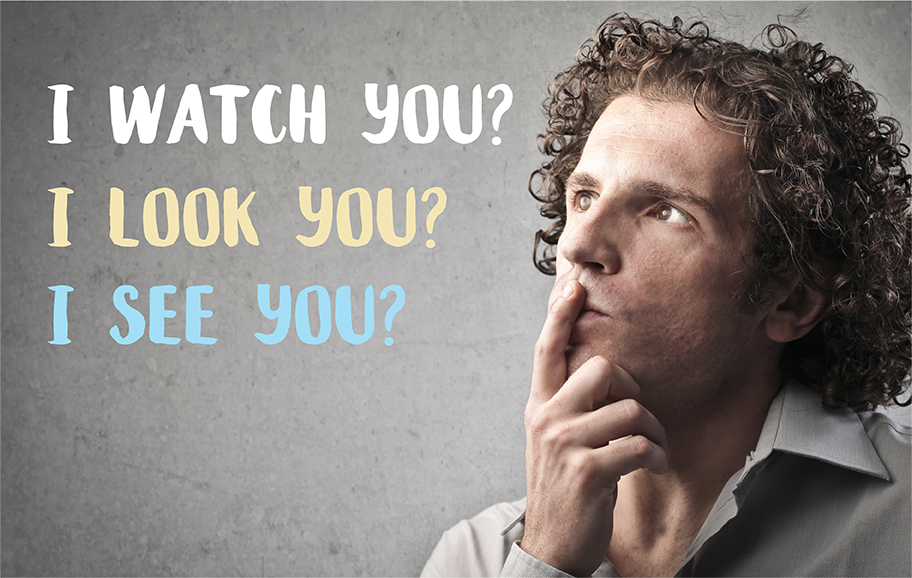What’s the difference between look, see, and watch? They all mean to use your eyes, but how are they different? In this vocabulary lesson, we’ll “take a look” at these three words and learn what they mean. We’ll also talk about some very common idioms and expressions you can learn and use when YOU speak English!
1. Look
According to the Oxford Learner’s Dictionary, “look” means to turn your eyes toward something. “Look” is pronounced like “book” – lʊk. This word is all about the thing that you are seeing.
- Jesus looked closely at the man… (Mark 10:21)
- God looked at the light and saw that it was good… (Genesis 1:4)
- …Everyone in the synagogue looked straight at Jesus. (Luke 4:20)
Did you notice that “look” is followed by the preposition “at” in our sample sentences? This is the most common use of the verb “look.” You “look at” something. You can look at a map or look at a menu. Just remember, when you use the phrase “look at,” you are talking about the thing you see.
Look - Expressions and Phrasal Verbs
There are other prepositions that can follow the verb “look.” They will make the verb mean something a little different. Here are some examples:
1. look for – to search for something
This is often used in the present continuous tense, though you will also see it in the past continuous or the past simple. Don’t use it in the present simple tense, because though it is grammatically correct, it is not really used that way in contemporary English.
- Then you will look for me, but you won’t find me… (John 13:33)
- “We are looking for Jesus from Nazareth,” they answered. (John 18:7)
2. look after – to take care of somebody or something.
- “How should I know?” he answered. “Am I supposed to look after my brother?” (Genesis 4:9)
- Look after yourselves and everyone the Holy Spirit has placed in your care. (Acts 20:28)
3. look like – to resemble, or to appear to be something else
- After the dew had gone, the desert was covered with thin flakes that looked like frost. (Exodus 16:4)
- “What did the man look like?” Ahaziah asked. (2 Kings 1:7)
2. See
“See” means to become aware of something by using your eyes, according to the Oxford Learner’s Dictionary. When you use the verb “see,” you are talking more about the process of using your eyes than the thing you see.
- …”Amos, what do you see?”…(Amos 8:2)
- But we live by faith, not by what we see. (2 Corinthians 5:7)
See - Expressions and Phrasal Verbs
Here are more ways the verb “see” can be used in very common expressions.
1. Let’s see – idiom that means you don’t know exactly what will happen next.
- “Let me see if I can find someone who will let me pick up the grain left in the fields by the harvest workers…” (Ruth 2:1)
- Let’s see if this old phone works.
2. See (the doctor) – to have an appointment with someone.
- He needs to see the doctor for his headache.
- I‘m seeing my accountant on Tuesday.
3. I see, you see, etc. – to understand something
- Do you see what I mean?
- …”Then you can see for yourselves that I have not found him guilty.” (John 19:4)
3. Watch
When you “watch” something, you look at it for a period of time and pay close attention to it. A very common expression is to “watch TV.” You are doing more than “seeing” or “looking.” You are paying attention and thinking about what you see.
- One Sabbath, Jesus was having dinner in the home of an important Pharisee, and everyone was carefully watching Jesus. (Luke 14:1)
- He took it and ate it as they watched. (Luke 24:43)
- The Lord sees everything, and he watches us closely. (Proverbs 5:21)
Watch - Expressions and Phrasal Verbs
There are a few expressions and phrasal verbs that use the verb “watch.” Here are two of the most common.
1. Watch over – to guard and protect somebody or something
- Just as shepherds watch over their sheep, you must watch over everyone God has placed in your care… (1 Peter 5:2)
- The Lord watches over everyone who obeys him, and he listens to their prayers… (1 Peter 3:12)
2. Watch out – warns about something dangerous
- …”Watch out!” the Lord says… (Jeremiah 8:17)
- Jesus answered: Watch out and don’t let anyone fool you! (Mark 8:15)
Let's Review
I hope you understand a little better when to use the verbs look, see, and watch.
Look – to see a thing or a person with your eyes (look at). “Look” focuses your attention on the thing you see.
See – to use your eyes to become aware of something or to notice it. “See” focuses your attention on the process of using your eyes to notice something.
Watch – to look at something over a period of time, or to pay attention to something you see.
Click the button to download a PDF worksheet that will help you remember how to use these words and some of the very common expressions and idioms you may hear. I hope this lesson has helped you! See you next time!


